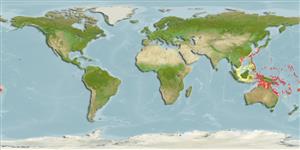Common names from other countries
Classification / Names / Names
Populärnamn | synonymer | Catalog of Fishes (gen., sp.) | ITIS | CoL | WoRMS
Environment: milieu / climate zone / depth range / distribution range
Ekologi
; djupintervall 2 - 52 m (Ref. 100541). Tropical
Western Central Pacific: Papua to Fiji.
Length at first maturity / Size / Vikt / Age
Maturity: Lm ? range ? - ? cm Max length : 4.0 cm ShL hane/ej könsbestämd; (Ref. 8763)
Life cycle and mating behavior
Könsmognad | Reproduktion | Lek | Ägg | Fecundity | Larver
Members of the order Neotaenioglossa are mostly gonochoric and broadcast spawners. Life cycle: Embryos develop into planktonic trocophore larvae and later into juvenile veligers before becoming fully grown adults.
Heiman, E. 2007. (Ref. 8761)
IUCN Red List Status (Ref. 130435)
CITES status (Ref. 108899)
Not Evaluated
Not Evaluated
Human uses
| FishSource |
Verktyg
Ytterligare information
Age/Size
Tillväxt
Length-weight
Length-length
Morfologi
Larver
Abundans
Internet-källor
Estimates based on models
Preferred temperature
(Ref.
115969): 24.6 - 28.9, mean 27.5 (based on 270 cells).
Vulnerability
Low vulnerability (10 of 100).
